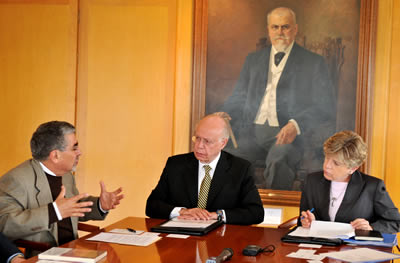ECLAC Signed Agreement With the Union of Universities of Latin America and the Caribbean
Topic(s)
The agreement establishes academic cooperation in areas relating to the economic and social development of the region.

(30 January 2012) The Executive Secretary of the Economic Commission for Latin America and the Caribbean (ECLAC), Alicia Bárcena, said, "the cooperation agreement that we signed today with the Union of Universities of Latin America and the Caribbean (UDUAL) will strengthen a shared agenda on research, debate and training of professionals with a deep sense of Latin America."
On Monday, the head of this regional commission of the United Nations and the Secretary-General of UDUAL, Roberto Escalante, signed in Mexico City, Mexico, an agreement for inter-institutional cooperation in such areas as economic and social development of the region, especially to promote networks for hemispheric education, climate change, environmental taxation and the Latin America-Asia relations.
The ceremony held at the National Autonomous University of Mexico (UNAM) was chaired by José Narro, Dean of the UNAM, acting as an honor witness. It was also attended by the Director of the Subregional headquarters of ECLAC in Mexico, Hugo Beteta, the Chief of the Climate Change Unit of ECLAC's Sustainable Development and Human Settlements Division, Luis Miguel Galindo, the Director of UNAM's Faculty of Economics, Leonardo Lomelí, and the representatives of UDUAL, Antonio Ibarra y Jorge Peralta.
The agreement, which will be in place for five years, includes the organization of meetings, seminars, workshops, courses and consultancies, collaboration between officials and consultants from both institutions in studies and projects, exchange of professionals and materials, and the publication of documents and other outreach activities.
"ECLAC has always been associated with our universities' academic life, which has enabled it to renew ideas, principles and convictions which have been firmly founded. Therefore, we celebrate this agreement between this important regional Organization and UDUAL," stated Roberto Escalante.
UDUAL, founded in 1949, is made up of more than 190 higher education institutions, national and subregional university networks and Latin American disciplinary organizations in different areas of knowledge.
Both institutions "share the mission of promoting the development of our region through the reflection and generation of knowledge," stated Ms. Bárcena. For ECLAC "strengthening partnerships with academic bodies is a long-standing tradition, both for improving mutual analytical capacities and also for discussion on the development of the region," concluded the Executive Secretary.
Any queries should be addressed to the ECLAC Public Information and Web Services Section.
E-mail: dpisantiago@cepal.org ; Telephone: (56 2) 210 2040.
Country(ies)
-
Mexico
Contact
Public Information Unit
- prensa@cepal.org
- (56 2) 2210 2040